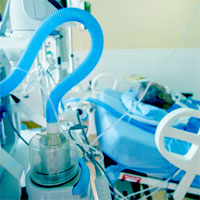Stories Category: Intensive Care

Respiratory Support for Patients with COVID-19 Infection
Coronavirus disease 2019 (COVID-19) has affected more than 50 countries so far this year. Xiaobo Yang and colleagues described in their single-centered, retrospective, observational study that 52 of 710 patients with confirmed... read more

Impact of Protocolized Diuresis for De-resuscitation in the ICU
Using a diuresis protocol for volume de-resuscitation, we demonstrated a significant decrease in net cumulative fluid balance at 72 h following shock resolution, with potential benefit on clinical outcomes including renal... read more

Flow-controlled Ventilation Enhances Lung Aeration
Lung-protective ventilation for acute respiratory distress syndrome (ARDS) aims for providing sufficient oxygenation and carbon dioxide clearance, while limiting the harmful effects of mechanical ventilation. This study... read more

One Doctor’s Life on the Coronavirus Front Lines
Driving one evening in Wuhan, China, last month, Zhang Xiaochun pulled her car to the side of the road. She was on the verge of a breakdown. She'd been working nonstop for days at the center of China's coronavirus outbreak,... read more

Effect of Vitamin C and Thiamine on Time Alive and Free of Vasopressor Support Among Patients With Septic Shock
A 2020 randomized trial reported no difference in duration of time alive and free of vasopressor administration at 7 days among intensive care unit (ICU) patients with septic shock assigned to vitamin C, thiamine, and hydrocortisone... read more

COVID-19 Situation in Japan
Dr Adrian Wong speaks to Prof Satoru Hashimoto on the #COVID19 situation in Japan in this ESICM podcast. Dr Adrian Wong is a consultant in critical care in King’s College Hospital, London. He is the chair of the Editorial... read more

Relative Hypoglycemia in Diabetic Patients With Critical Illness
In ICU patients with diabetes, relative hypoglycemia is common, increases with higher hemoglobin A1C levels, and is a modifiable risk factor for both mortality and subsequent absolute hypoglycemia. These findings provide... read more

Validation of Neuromuscular Blocking Agent Use in ARDS
The use of Neuromuscular Blocking Agents (NMBA) could significantly decrease mortality in moderate-to-severe acute respiratory distress syndrome (ARDS) patients and decrease the incidence of barotrauma during mechanical ventilation.... read more

ECMO Support in Coronavirus Disease 2019 (COVID-19)
Extracorporeal membrane oxygenation (ECMO) use has been increasing in severe respiratory and/or cardiac failure despite implementation of conventional care. This technology has been proven valuable in treating viral pneumonia... read more

Multi-Modal Characterization of the Coagulopathy Associated With ECMO
The extracorporeal membrane oxygenation(ECMO)-associated coagulopathy is a multifactorial and quickly developing syndrome. It is characterized by individual changes of coagulation parameters and platelets and is aggravated... read more

Life Following Pediatric Septic Shock
Margaret M. Parker, MD, MCCM, and Jerry J. Zimmerman, MD, PhD, FCCM, talk about the trajectory of long-term mortality and significant health-related quality of life disability among children encountering septic shock. This... read more

Review of the Current Evidence on COVID-19 in Intensive Care
Join Dr. David Lyness as he discusses the current evidence on COVID-19 in Intensive Care. A coronavirus is one of many viruses that cause diseases in mammals and birds. In humans, coronaviruses cause respiratory tract... read more

Association of Initiation of Dialysis with Hospital Length of Stay and Intensity of Care in Older Adults With Kidney Failure
In this cohort study, compared with non-dialysis care, patients who received maintenance dialysis spent more time in the hospital and were more likely to be admitted to intensive care units. This finding suggests trade-offs... read more

Critical Care Crisis and Some Recommendations During the COVID-19 Epidemic in China
The COVID-19 epidemic has placed a huge burden on the Chinese health care system. This crisis has dramatically affected the delivery of critical care due to a lack of resources, lack of prediction models and of course the... read more

Imaging Changes of Severe COVID-19 Pneumonia in Advanced Stage
The imaging changes of acute stage from a case of 75-year-old male patient with severe COVID-19 pneumonia combined acute respiratory distress syndrome (ARDS), septic shock, and multiple organ dysfunction syndrome (MODS) who... read more

The Dyspnoea-inactivity Vicious Circle in COPD: Development and External Validation of a Conceptual Model
The vicious circle of dyspnoea-inactivity has been proposed, but never validated empirically, to explain the clinical course of chronic obstructive pulmonary disease (COPD). We aimed to develop and validate externally... read more

Harmful Effects of Mechanical Ventilation on Neurocognitive Functions
Whether mechanical ventilation (MV) induces neurotoxicity that can trigger or accelerate chronic cognitive disorders is controversial. The relationship between MV and neurocognitive impairment, that persisted at hospital... read more








